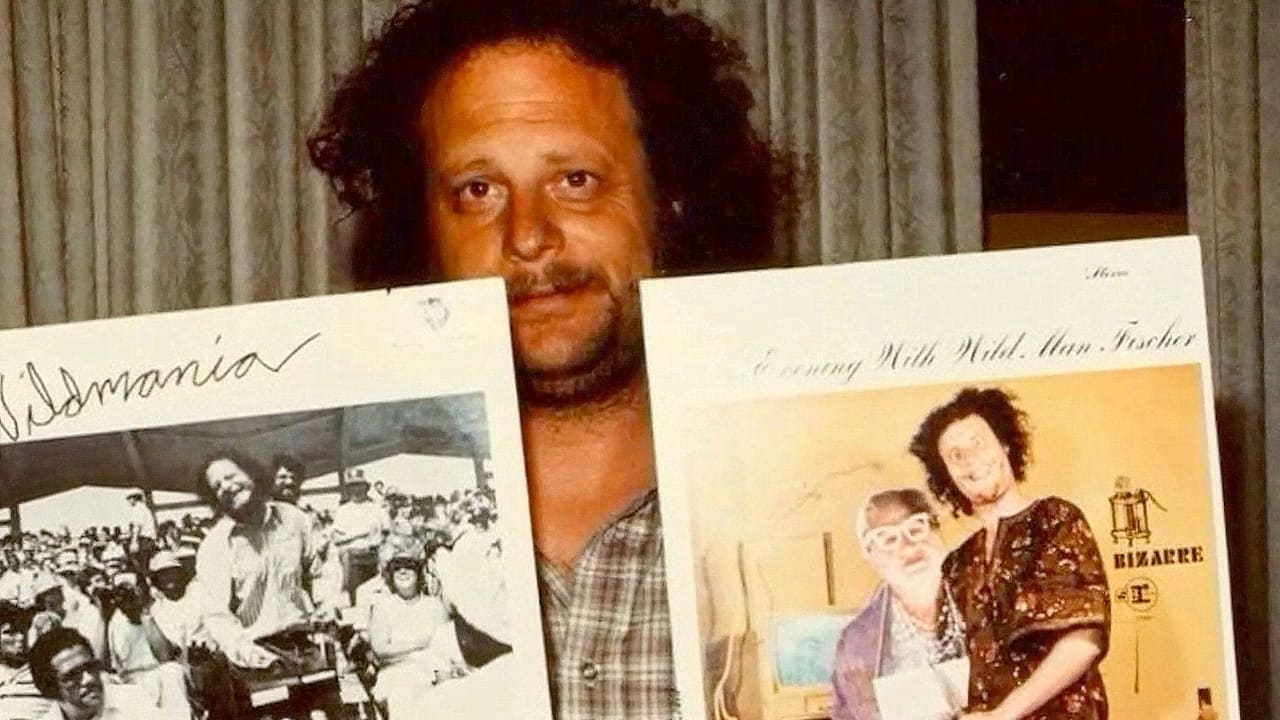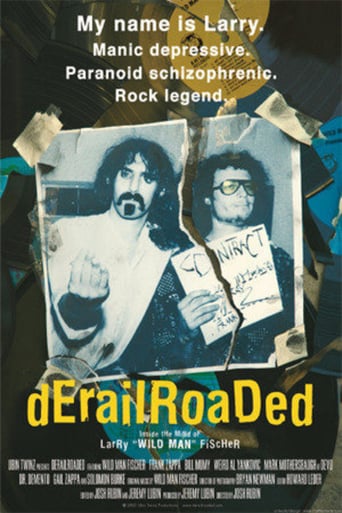

I've read several reviews here that are very negative principally because the reviewer found Wild Man Fischer's music to be either annoying or talentless or some combination of the two.While it is true that without his music Wild Man Fischer would have no claim to fame, and sometimes it's difficult to see the connection between all the plaudits lauded upon him by the various celebrities in this documentary and the numerous rather poor examples of his songs generously placed throughout the film, this documentary isn't really about how great or annoying his music is, it's about the Wild Man himself, and it turns out that it's a genuinely interesting story expertly told.I have to admit here some bias. I am one of the handful of people who actually purchased "An Evening With Wild Man Fischer" when it was originally released in the late 60s. I listened to that record quite a bit actually. I never once thought of Wild Man Fischer as a great Artist (with a capital "A") but I did recognize that there was more to the music than the surface - the music revealed the man underneath and his tragic story which was interesting. Plus, the record WAS entertaining in an odd sort of way.Larry "Wild Man" Fischer in many ways was saved by his music. Not only has it been his means of escape throughout his life, a bizarre sort of self therapy, but it has also served as a magnet drawing in people who through their influence and belief in his music have gone out of their way to be helpful to him. People like Frank Zappa, Mark Mothersbaugh, Barnes & Barnes & Rosemary Clooney to name just a few. That's really what this story is about.And as it turns out, Larry doesn't make it very easy to be helpful to him.Time after time his paranoia causes those close to him to have to distance themselves - sometimes for their own safety - because Larry really is a wild man who is subject to paranoid delusions as well as auditory hallucinations. This even happens to the filmmakers during the course of filming this documentary.The filmmakers do an exceptional job not only of following Wild Man Fischer around and documenting his various moods and behaviors, but they manage to get access to many people who have known or worked with Larry in the past and get their takes on different events (I do wish though that Dr. Demento had been encouraged to sit up for his interview - he reclines on his side with his head propped up for the duration of his interview while duded out in his Dr. D outfit - complete with top hat - it's distracting and makes him look like a pretentious doofus). In addition there's a lot of rare archival footage in the movie which I found highly entertaining. There's an exceptional animated segment produced by Pat Moriarity that was also memorable.What I wasn't prepared for was the overall sadness of the movie, sad in that here is a man who genuinely has a vision and a desire and the determination to try to make something of himself but whose affliction is at the same time both the wellspring of his inspiration and the source of his inability to achieve his goals. When he has his paranoid schizophrenia in check he loses his 'pep' as he calls it, his ability to create and perform, so the irony is that when he loses his mental disorder, he loses his art. Put another way, if Larry wasn't crazy, he'd be a nobody.Sad also because here is a man who obviously craves attention and love and yet his paranoia constantly rears its ugly head and destroys important relationships needlessly. Bill Mumy, probably the longest running relationship in his life, finally had to distance himself from Larry. When asked what was the best thing about working with Barnes & Barnes Fischer answers without hesitation that the best thing about it was having Bill Mumy to talk to - having him to talk to all the time. When asked how he feels about the fact that he no longer has a relationship with Bill Mumy, he tears up some papers the filmmakers are working from then walks off.The final scenes in the film at the side of his bed-ridden aunt, probably the only family member who really believed in him and gave him unconditional love, are genuinely heart rending."Derailroaded", like all good documentaries, encompasses the totality of its subject and brings it home in all its ugly-beautiful reality. In many ways, this documentary reminded me of "Crumb" in its mixture of oddball outsider pathos. Deserves to be seen.
... View MoreDerailroaded has to be one of the worst, most unnecessary pieces of filmaking ever. The object of this film is Larry "Wildman" Fischer a quasi musician of dubious importance. We learn Wildman Fischer enjoyed some minor success as a fringe artist in the seventies. I use the term artist in the most liberal terms, as Larry's artistry consists of screaming nonsensical lyrics into the microphone. Absolutely awful sounding. It couldn't really be fairly described as music.They follow the exploits of Fischer, a paranoid schizophrenic, from his early years through the near present. Most of the current footage is done with a camera and microphone in Larry's face with predictably obvious results. The audience doesn't need an hour and a half of this to see the poor fellow needs some help. The whole wretched thing has a carnival side-show feel to it. This film is so over the top that for a while I thought it was a docu-drama spoof in the vein of Blair Witch Project. In the end you wonder if this was about mental illness or the fall of a Rock Musician. Sad to say I don't think many people have even heard or care about Fischer as a musician. Even fewer will care about the films treatment of schizophrenia. Either way it's a complete flop.
... View MoreDerailroaded played at the Kansas Film Festival on 09/10/05 and I got a ticket. The documentary is of Wild Man Fischer, a Rock singer from the 1960's. I never heard of him but Frank Zappa produced one of his albums and he was the initial pitchman for Rhino records and recorded the Rhino radio jingle. Wild Man Fischer suffers from paranoid schizophrenia which has profoundly impacted his life and career. In some of the concern footage from the early 60's you see him jamming with Frank Zappa (very nice to see him again) and see glimpses of what might have been. For years Dr. Demento was a big fan. In fact he played once at Giants stadium with Zappa, Janice Joplin, The Byrds and Hendrix so he wasn't a hack. If you have never been around true mental illness this film is an eye-opener. Mental illness isn't funny; in fact it is extremely scary. Fascinating movie. Two things stand out for me. The first is Billy Mummy (the kid from "Lost in Space") turned out pretty well. In fact he seemed to have his stuff together. He might be Wild Man's only friend. The second was the Dr. Demento puppet show where Frank Zappa finds out how crazy Wild Man really is and breaks it off. The family interviews are touching and tragic. His family has pretty much stuck by Wild Man all these years and seem to truly care about his welfare. From the Aunt dying of cancer who gives him a place to live to his brother dropping off groceries. A wonderful glimpse into the birth of Rock and Roll and a life completely out of control. See it.
... View MoreI had the pleasure of being in the audience during the East Coast premiere of "Derailroaded." Never having heard of Wild Man Fischer, I didn't know quite what to expect other than a documentary on an outsider musician in the vein of Wesley Willis. This film tells a touching story about a troubled rock and roll singer. There were moments in the film where I almost felt tears swell up, and there were moments when I got shivers watching Wild Man perform. It's a very nice human interest piece. The only real problems with it is the sound editing. The volume is often too high during sections of Wild Man's 2001 performance in Los Angeles. There are also moments where the background music buries the interview dialogue so you can hardly make out what's being said. We were told this was because the audio sources varied, but I still felt like this could've been corrected. Disregarding this, a lot of us in the audience came out humming Wild Man songs. This really sparked an interest for me and I feel it is a fitting tribute to an almost rock legend.
... View More